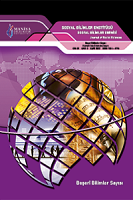Türkiye’de Eğitimin Gelir Dağılımı Üzerine Etkisinin İncelenmesi (2003-2018)
Examining the Effect of Education on Income Distribution in Turkey (2003-2018)
Author(s): Gürkan SARIDAŞ, Kazim ÇELİKSubject(s): National Economy, School education, State/Government and Education, Sociology of the arts, business, education, Sociology of Education
Published by: Celal Bayar Üniversitesi Sosyal Bilimler Enstitüsü
Keywords: Education income inequality; Gini coefficient; Impact of education on income;
Summary/Abstract: Income distribution in a country cannot have absolute equality for various reasons. One of the main reasons for this can be shown as the differences between the education levels and abilities of the citizens. There are inequalities between the income distributions of the countries due to the differences in the abilities of the people. Eliminating this inequality in income distribution ensures a fair distribution of income within the country. Education is an important tool in the development of people's abilities, knowledge and skills. Therefore, one of the factors shaping income distribution is education. In the 2003-2018 data set revealed by the TUIK (Turkish Statistical Institute) Household Budget Survey data obtained, the Gini coefficient showing the income distribution inequality in Turkey gradually decreases, and the income distribution inequality between education levels is quite high. It has been found that the inequality between the incomes of people with the same education level is in the range of 10-15%, and in Theil Index, the inequality in the income distribution depends on the education level at a value varying between 86% and 89%. The level of education that disrupts inequality changes according to years, and it is observed that it is generally seen in high school and below. In this context, it has been suggested that the pyramid shape showing the education levels should be corrected, policies aiming to expand education should be developed, countries should increase their education levels within the scope of compulsory education, facilitate the provision of training through various institutions or organizations, and support the contribution of the knowledge and skills to be gained through education to economic growth.
Journal: Celal Bayar Üniversitesi Sosyal Bilimler Dergisi
- Issue Year: 20/2022
- Issue No: 03
- Page Range: 353-366
- Page Count: 14
- Language: Turkish

